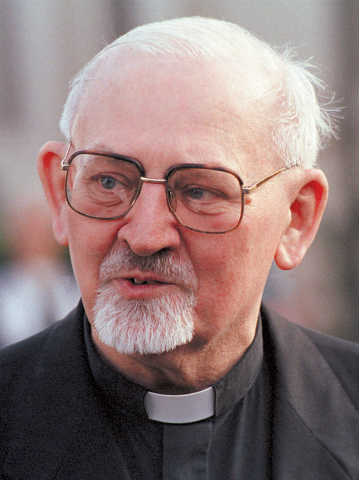
Father Peter-Hans Kolvenbach, former superior general of the Society of Jesus, is seen in this 2004 file photo. He died in Beirut Nov. 26, four days before his 88th birthday. (CNS photo/Greg Walker, Spring Hill College)
Jesuit Father Peter-Hans Kolvenbach, whose service as superior general of the Society of Jesus marked a return to normal governance after a period of tension with the Vatican, died in Beirut Nov. 26, four days before his 88th birthday.
After the Jesuit general congregation accepted his resignation as superior in 2008, he returned to Lebanon and served as an assistant librarian at the Jesuit-run St. Joseph University in Beirut.
In a message of condolence to Father Arturo Sosa, the current superior, and his brother Jesuits, Pope Francis praised Kolvenbach's "complete fidelity to Christ and his Gospel" and his "generous commitment to exercising his office with a spirit of service for the good of the church."
When Kolvenbach was chosen as superior general in 1983, his election marked the end of a two-year period in which a papal delegate, Jesuit Father Paolo Dezza, led the society.
St. John Paul II had bypassed the Jesuits' normal governing structure when he named Father Dezza interim head of the society after Father Pedro Arrupe, then-superior general of the Jesuits, suffered a stroke. The pope's action troubled many Jesuits, who saw it as a lack of papal trust in the order and its members' ability to govern themselves.
Born Nov. 30, 1928, in the Netherlands, he entered the Jesuits in 1948. In 1958, he was sent on mission to Lebanon, where he was ordained to the priesthood in the Armenian Catholic rite in 1961 and where he earned his doctorate in theology from St. Joseph University.
An expert in linguistics, he taught in The Hague, Paris and Beirut, before being named rector of the Pontifical Oriental Institute in Rome, the position he held when he was elected superior of the order.
